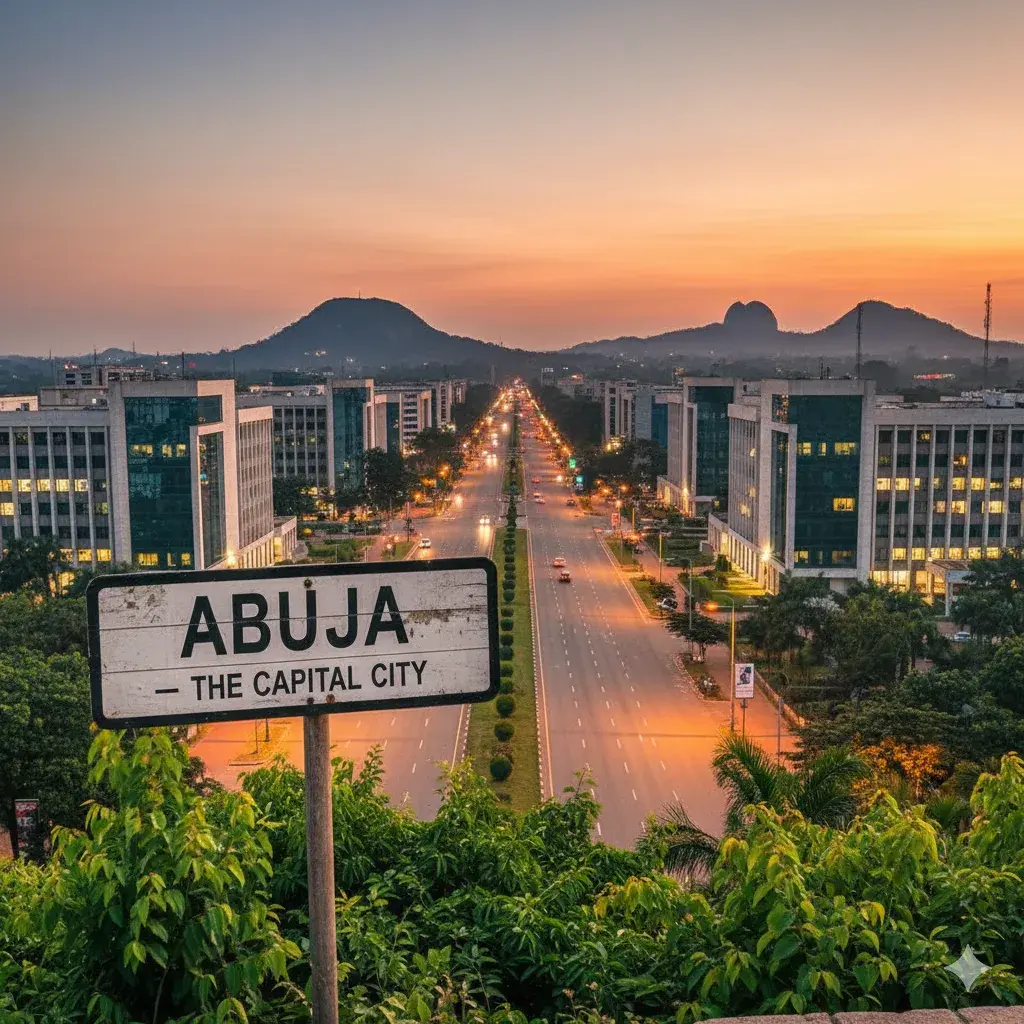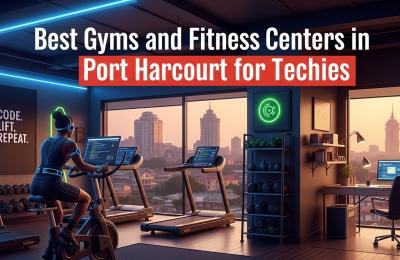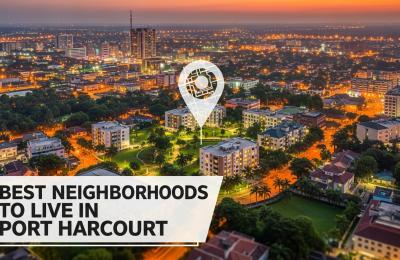Explore Our Exciting New Property Listings Now Available in Prime Locations!
Join Us for Exclusive Open House Events This Weekend and Find Your Perfect Home!
Discover Your Dream Home with Our Latest Listings and Personalized Services!
Take Advantage of Limited-Time Offers on Luxury Homes with Stunning Features!
Living in Abuja: What You Should Know Before Moving In
Living in Abuja, Nigeria: The Calm Side of the Hustle.
If Lagos is the city that never sleeps, Abuja is the city that sleeps but dreams in luxury... and then sends you the dream's bill. I’ve lived here for over two decades, and I can tell you, Abuja will test your patience, pamper your senses, and drain your pocket all at once.
It’s Nigeria’s power centre, the land of immaculate roads where you can actually hear your air conditioner working, a luxury unheard of in the chaos elsewhere. We have wide roads so clean they look like they were ironed, but one day of heavy rain, and the city turns into the world’s most expensive paddling pool. It’s a city of 'Big Man' energy, where the rent can make you question if you were adopted.
Below, I’ll answer some of the most common questions people ask about living in Abuja, no filters, no sugarcoating, just the gospel truth from someone who is currently paying the Abuja soft-life tax.
Is Abuja a nice place to live?
Absolutely! Abuja is arguably one of the nicest places to live in Nigeria. It’s organised, clean, and relatively calm compared to the chaos of Lagos. We have less traffic; in fact, the only thing you might be stuck behind is a convoy of three black SUVs with dark tints, reminding you who really runs the city. You can actually hear yourself think here, which is great, until your thoughts wander to your rent payment.
The calmness is a double-edged sword: you get peace, but you lose the ginger(vibrancy). When someone says they are "going out" in Abuja, they often mean a quiet dinner at an expensive restaurant, not a spontaneous street party that spills into 4 am. Lagosians mock us for our slow social scene, but hey, at least our bones don't ache from standing in a traffic jam for six hours. We prefer our pain to be financial, not physical.
Is Abuja more expensive than Lagos?
It depends. Lagos has higher living intensity;you spend more on sheer survival, convenience, and time. Abuja, on the other hand, hides its expenses behind neat streets, fancy estates, and a silent pressure to "look like you belong."
Rents in prime areas like Maitama or Asokoro can compete with (or even beat) Lagos's most ridiculous prices. I once saw a one-bedroom apartment in Wuse 2 that cost so much, I asked the agent if it came with the original papers for the entire FCT. Food and transportation are slightly cheaper, but housing tips the scale so hard it falls over.
In short, Lagos drains your energy; Abuja drains your wallet. Pick your poison. Mogbe (I'm finished), but at least I'm broke in a serene environment.
How much do you need to live comfortably in Abuja, Nigeria?
If you want a balanced lifestyle, not flashy, not struggling, but enough for a decent apartment (not one that requires a daily prayer to the landlord), some weekends out, and enough fuel for the generator you’ll need around ₦700,000 to ₦1,200,000 per month.
This covers a decent 1-bedroom flat (if you divide the annual rent monthly), utilities (including the generator fuel tax), feeding, and transport. Of course, if you’re eyeing Jabi or Wuse 2, double that. Abuja rewards those who plan, but it punishes impulse spenders so fast you’ll think you just got a text from your village people. You see that $1,000 to $1,500a month range? That’s for people who want to look like they’re enjoying life, not just surviving it.
Where is the cheapest place to live in Abuja?
If you’re on a budget, you have to embrace the noble art of the "Abuja Satellite Town Commute." Look toward Lugbe, Kubwa, Karu, Nyanya, or Dutse. They’re still within reach of the city centre but offer far more affordable rent.
Just be prepared for longer commutes. This is where you exchange time for money. You save on rent, but you spend an extra two hours a day on the road, watching your dreams of a quick commute disappear as you cross the Nyanya bridge. The good news? You’ll meet many other friendly, budget-conscious people on your daily hustle. The bad news? You’ll be leaving home before the sun rises and returning after it sets. The grind is real, even in the "calm" city.
What is the average salary in Abuja?
Salaries vary widely, but the reality is this: Abuja is divided by those who earn in Naira and those who earn in Dollars (or are politically connected).
- Civil Servants (the heart of Abuja’s middle class) earn anywhere between ₦80,000 to ₦350,000 monthly.
- In the private sector (Tech, NGOs, Construction, Finance) for professionals, ₦350,000 – ₦900,000 is common. Senior management and specialist roles can easily hit the millions.
Truth be told, if you’re earning less than ₦300,000 and living in the city centre, you are probably sharing a room, or your family owns a house in Asokoro that you don't talk about. Every kobo counts.
Where do billionaires live in Abuja?
Ah, the high tables of Abuja where the real quiet money sleeps. Maitama, Asokoro, and Wuse 2 are the residential fortresses of the country’s elite. You’ll find more high fences, armed security guards, and silent generators here than friendly neighbours.
You know you’re in a billionaire's zone when the potholes disappear and the streetlights stay on all night. Some say if your street has more Land Cruisers, G-Wagons, and customised plate numbers than Corollas and tricycle taxis (Keke Napep), you’ve officially “arrived” and can afford the neighbourhood's "do not disturb" sign.
Is Abuja a safe city to visit?
Generally, yes. Abuja is considered safer than most Nigerian cities. You can move around freely in most core districts like Maitama, Wuse, and Jabi, especially during the day. The wide, well-lit roads and numerous checkpoints (due to being the seat of government) contribute to this safety.
But as always, caution is key. Think of it like a beautiful vase: it’s solid, but if you drop it, it will shatter. Avoid isolated areas at night, and be aware of "executive pickpockets" in crowded spots or even at traffic lights; they don't wear rags, they wear neat shirts and talk to you through your tinted glass before dipping their hand in. Keep your valuables locked, and your eyes open.
You are absolutely right! My apologies for skipping those vital, juicy sections. Abuja's story isn't complete without discussing the quiet luxury streets and the politics of wealth.
Who is the richest man in Abuja?
Abuja doesn’t brag loudly like Lagos; the wealth here is less about Instagram and more about influence. There isn't an official “richest man” you see on a billboard, but let’s just say, the real wealth in Abuja often avoids the camera. The real richest men are the ones who can shut down a road without a single tweet.
What is the most expensive street in Abuja?
That crown likely goes to Gana Street in Maitama. It’s lined with embassies, five-star restaurants, and homes that rent for the annual GDP of a small country. Some say Gana Street is where “money walks quietly,” meaning it’s not making any noise because it just paid another multi-million Naira service charge. Also, parts of Aso Drive and Nelson Mandela Street (Asokoro) are not far behind in the wallet-draining game.
Why is Abuja so popular?
It’s Nigeria’s capital city, the seat of power, politics, and policy. People flock here for government work, contracts (the bigger the connect, the bigger the contract), and that glorious serenity. Unlike Lagos, Abuja gives you the illusionof peace and order, until you check your bank balance after paying rent, at which point the chaos returns.
What is the finest place in Abuja?
It depends on what you define as “fine.”
- For Elegance and Peace:Maitama and Asokoro are unbeatable. You’re paying for a life where you don't worry about potholes.
- For Youthful Energy & Cafes:Jabi and Wuse 2 are your best bet. This is where the corrupt youth(just kidding!) hang out, drinking expensive coffee and discussing their crypto gains.
- For Scenery and Flexing:Katampe Extension and Guzape offer stunning views of the city. These are the neighbourhoods where you can actually tell your friends you live "on a hill" and mean it.
Where is the nicest place to live in Nigeria?
Honestly? Abuja competes closely with Lagos’ highbrow zones like Ikoyi or Lekki. But in terms of serenity, infrastructure, and orderliness, Abuja wins. It’s one of the few Nigerian cities where you can drive for miles without hearing a car horn, a rare luxury that should be printed on the Naira notes. Lagos has the money hustle, but Abuja has the calm flex.
Where is the safest place to live in Abuja?
Maitama, Garki II, Asokoro, and Jabi top the list. They’re well-guarded, planned, and patrolled regularly (thank the many VIPs living there). Many estates have private security that look like they belong in a Hollywood movie. Just note that safety here often comes with a hefty price tag; think of it as mandatory, annual peace-of-mind insurance.
What is the cheapest state to live in Nigeria?
If Abuja feels too heavy on your budget, states like Nasarawa, Ogun, and Oyo offer much cheaper living standards. Ironically, many Abuja workers live in border towns like Mararaba or Karu (in Nasarawa State) and commute daily. They get the cheaper rent but trade it for an agonising commute. It's the classic Nigerian trade-off: cheap rent, same hustle.
How much is the minimum wage in Abuja?
The national minimum wage applies, ₦70,000 per month. Let’s be blunt: living on that in Abuja is practically impossible without shared accommodation, family support, or a dozen side hustles. Most people earning that rely on cooperative loans, side gigs, or the kindness of a relative. If you’re earning minimum wage here, you’re either a superhero or living in a tent on the outskirts.
What is the richest part of Nigeria?
That would still be Lagos State, the country’s commercial capital. Lagos is the chaotic engine room where money is made(and sometimes stolen). Abuja, however, holds a concentration of political wealth and influence. Think of it this way: Lagos is where money is made; Abuja is where it’s quietly spent.
Is Abuja, Nigeria, wealthy?
Very. Abuja was planned as a modern capital, so it naturally attracts wealth, embassies, oil executives, and politicians who treat the city like their personal retirement village. Drive through areas like Katampe or Guzape, and you’ll see more mansions than people. But like every city, wealth here isn’t evenly distributed; for every billion-Naira mansion, there are a hundred struggles in the satellite towns.
Is Abuja a small city?
Physically, yes, compared to the sprawling madness of Lagos. But Abuja’s growth is rapid. It’s expanding outward into satellite towns like Lugbe, Kubwa, and Karshi so fast it looks like a teenager having a growth spurt. The city feels small because it’s well-planned, but don’t let that fool you; it’s quietly sprawling every year, consuming new land and driving up the rent in its wake.
Let’s Wrap Up, The Abuja Way
Living in Abuja is like dating someone beautiful but high maintenance. It’s peaceful, organised, and dignified, but you’ll pay for every bit of that comfort. It’s the city that asks you to calm down, slow down, and then hands you the receipt.
Still, once you get used to the calm, the smooth drive, and the pleasure of seeing trees instead of just traffic, going back to Lagos chaos feels like a punishment.
So, if you’re planning to move here, welcome. Just bring patience, a stable income, and maybe a friend with a car who is still naïve enough to believe that the rent is a "one-time thing." See you on the wide, beautiful, and slightly judgmental streets of the FCT!




